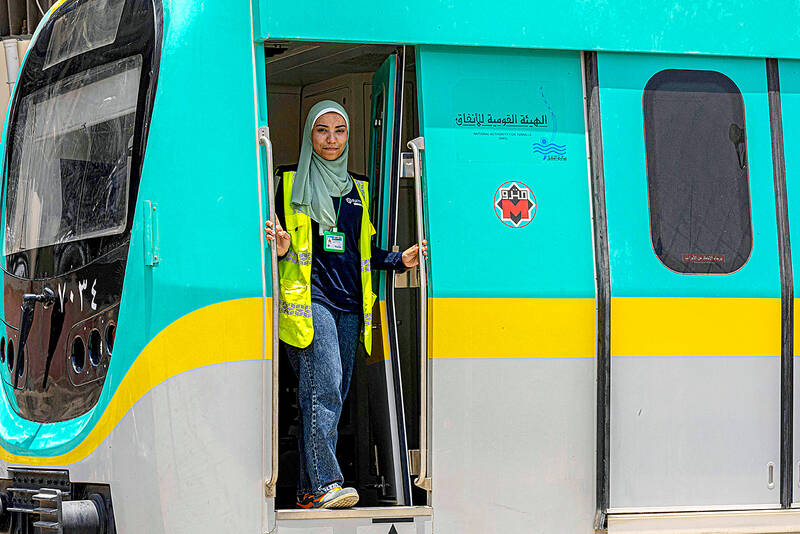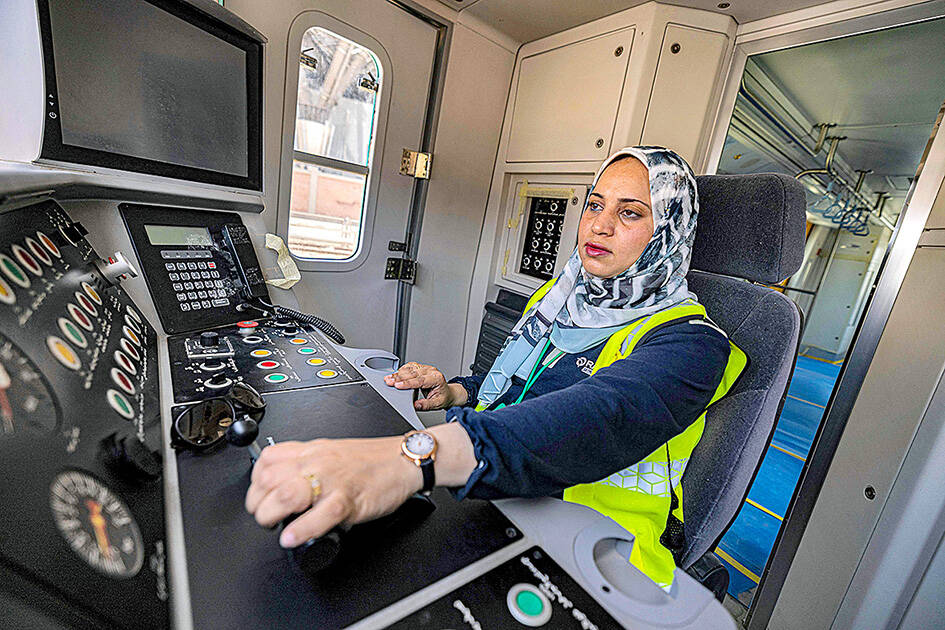As it prepares to expand to serve a population now exceeding 20 million, the Cairo metro has recruited Egypt’s first female train drivers, a novelty in a country where few women have formal jobs.
Since April, commuters on the network’s newest line have seen women take the controls in the driver’s cab, with reactions ranging from raised eyebrows to outright disapproval, according to the two pioneers.
Egyptian women have had the right to vote and stand for office since 1956, but patriarchal legislation and a male-dominated culture have severely limited personal rights.

Photo: AFP
The Cairo metro itself provides reserved carriages for women who do not wish to ride with men in an attempt to provide protection against sexual harassment.
Business graduate and mother of two Hind Omar said she had rushed to apply to be a train driver, eager to be a pioneer in a country where only 14.3 percent of women are in formal employment, according to 2020 figures.
“I have several thousand lives in my hands every day,” the 30-year-old said, proudly wearing a fluorescent jacket emblazoned with the RATP-Dev logo of the foreign operations arm of the Paris metro beneath her black and white headscarf.

Photo: AFP
Omar acknowledged that she had been lucky to have the support of her family.
“My parents found it strange at first but they ended up supporting me,” she said.
“My husband was enthusiastic from the start and always encouraged me.”
A key factor had been the exemption from night shifts offered to women drivers, she said.
Omar said the tests for would-be drivers had been gruelling, requiring candidates to demonstrate their “attention span” and “endurance.”
She said drivers had to remain “extremely vigilant for long hours” during a six-day working week.
Omar was one of two women accepted for the training programme run by Egypt’s National Authority for Tunnels in cooperation with RATP-Dev.
The other, Suzanne Mohamed, 32, recalled the first time commuters on the platform saw her in the driver’s cab.
She said she could understand “they were surprised” in a country where women have limited access to many careers.
“Some passengers were afraid,” she said. “They doubted my skills and said they didn’t feel safe with a woman at the controls.”
Launched in 1987, the Cairo metro is the oldest in the Arab world but it has fallen behind other Arab countries in providing employment opportunities for women.
Moroccan Saida Abad became the first female train driver in Africa and the Arab world in 1999.
Even in Saudi Arabia, where until recently women were banned from driving cars, a first group of women is currently in training to be drivers on the railways.
With the Cairo metro planning to add three new lines as well as Egypt’s first monorail system, Omar said she hoped her example would help “pave the way for other women” to become train drivers and ensure “that there’s a lot of us.”

Behind a car repair business on a nondescript Thai street are the cherished pets of a rising TikTok animal influencer: two lions and a 200-kilogram lion-tiger hybrid called “Big George.” Lion ownership is legal in Thailand, and Tharnuwarht Plengkemratch is an enthusiastic advocate, posting updates on his feline companions to nearly three million followers. “They’re playful and affectionate, just like dogs or cats,” he said from inside their cage complex at his home in the northern city of Chiang Mai. Thailand’s captive lion population has exploded in recent years, with nearly 500 registered in zoos, breeding farms, petting cafes and homes. Experts warn the

No one saw it coming. Everyone — including the Chinese Nationalist Party (KMT) — expected at least some of the recall campaigns against 24 of its lawmakers and Hsinchu Mayor Ann Kao (高虹安) to succeed. Underground gamblers reportedly expected between five and eight lawmakers to lose their jobs. All of this analysis made sense, but contained a fatal flaw. The record of the recall campaigns, the collapse of the KMT-led recalls, and polling data all pointed to enthusiastic high turnout in support of the recall campaigns, and that those against the recalls were unenthusiastic and far less likely to vote. That

The unexpected collapse of the recall campaigns is being viewed through many lenses, most of them skewed and self-absorbed. The international media unsurprisingly focuses on what they perceive as the message that Taiwanese voters were sending in the failure of the mass recall, especially to China, the US and to friendly Western nations. This made some sense prior to early last month. One of the main arguments used by recall campaigners for recalling Chinese Nationalist Party (KMT) lawmakers was that they were too pro-China, and by extension not to be trusted with defending the nation. Also by extension, that argument could be

Aug. 4 to Aug. 10 When Coca-Cola finally pushed its way into Taiwan’s market in 1968, it allegedly vowed to wipe out its major domestic rival Hey Song within five years. But Hey Song, which began as a manual operation in a family cow shed in 1925, had proven its resilience, surviving numerous setbacks — including the loss of autonomy and nearly all its assets due to the Japanese colonial government’s wartime economic policy. By the 1960s, Hey Song had risen to the top of Taiwan’s beverage industry. This success was driven not only by president Chang Wen-chi’s